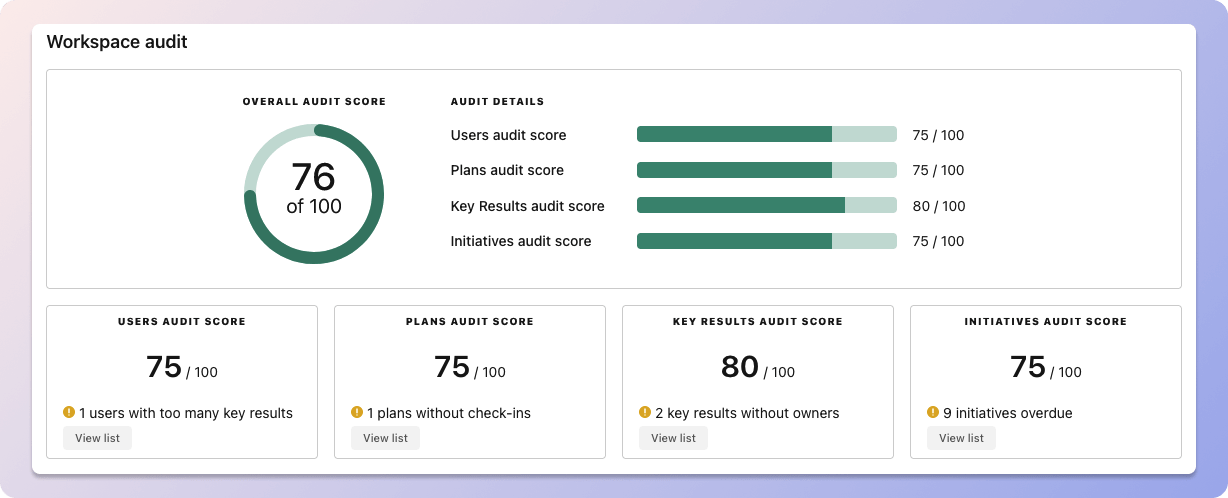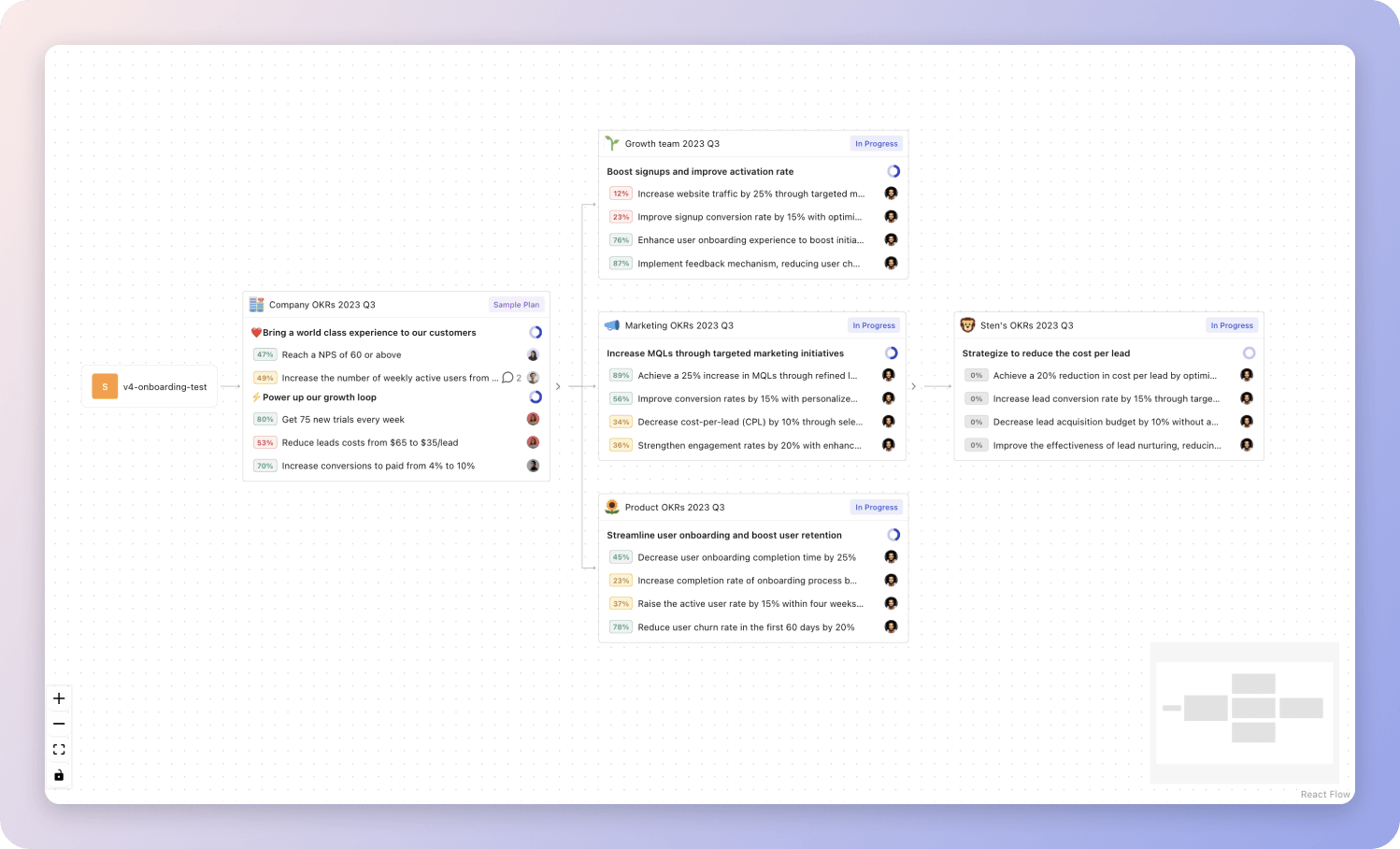1 OKR examples for Mentoring Program
What are Mentoring Program OKRs?
The Objective and Key Results (OKR) framework is a simple goal-setting methodology that was introduced at Intel by Andy Grove in the 70s. It became popular after John Doerr introduced it to Google in the 90s, and it's now used by teams of all sizes to set and track ambitious goals at scale.
Writing good OKRs can be hard, especially if it's your first time doing it. You'll need to center the focus of your plans around outcomes instead of projects.
We understand that setting OKRs can be challenging, so we have prepared a set of examples tailored for Mentoring Program. Take a peek at the templates below to find inspiration and kickstart your goal-setting process.
If you want to learn more about the framework, you can read more about the OKR meaning online.
Best practices for managing your Mentoring Program OKRs
Generally speaking, your objectives should be ambitious yet achievable, and your key results should be measurable and time-bound (using the SMART framework can be helpful). It is also recommended to list strategic initiatives under your key results, as it'll help you avoid the common mistake of listing projects in your KRs.
Here are a couple of best practices extracted from our OKR implementation guide 👇
Tip #1: Limit the number of key results
The #1 role of OKRs is to help you and your team focus on what really matters. Business-as-usual activities will still be happening, but you do not need to track your entire roadmap in the OKRs.
We recommend having 3-4 objectives, and 3-4 key results per objective. A platform like Tability can run audits on your data to help you identify the plans that have too many goals.
 Tability's audit dashboard will highlight opportunities to improve OKRs
Tability's audit dashboard will highlight opportunities to improve OKRsTip #2: Commit to the weekly check-ins
Don't fall into the set-and-forget trap. It is important to adopt a weekly check-in process to get the full value of your OKRs and make your strategy agile – otherwise this is nothing more than a reporting exercise.
Being able to see trends for your key results will also keep yourself honest.
 Tability's check-ins will save you hours and increase transparency
Tability's check-ins will save you hours and increase transparencyTip #3: No more than 2 yellow statuses in a row
Yes, this is another tip for goal-tracking instead of goal-setting (but you'll get plenty of OKR examples below). But, once you have your goals defined, it will be your ability to keep the right sense of urgency that will make the difference.
As a rule of thumb, it's best to avoid having more than 2 yellow/at risk statuses in a row.
Make a call on the 3rd update. You should be either back on track, or off track. This sounds harsh but it's the best way to signal risks early enough to fix things.
Building your own Mentoring Program OKRs with AI
While we have some examples below, it's likely that you'll have specific scenarios that aren't covered here. There are 2 options available to you.
- Use our free OKRs generator
- Use Tability, a complete platform to set and track OKRs and initiatives
- including a GPT-4 powered goal generator
Best way to track your Mentoring Program OKRs
Quarterly OKRs should have weekly updates to get all the benefits from the framework. Reviewing progress periodically has several advantages:
- It brings the goals back to the top of the mind
- It will highlight poorly set OKRs
- It will surface execution risks
- It improves transparency and accountability
Spreadsheets are enough to get started. Then, once you need to scale you can use a proper OKR platform to make things easier.
 Tability's Strategy Map makes it easy to see all your org's OKRs
Tability's Strategy Map makes it easy to see all your org's OKRsIf you're not yet set on a tool, you can check out the 5 best OKR tracking templates guide to find the best way to monitor progress during the quarter.
Mentoring Program OKRs templates
We've covered most of the things that you need to know about setting good OKRs and tracking them effectively. It's now time to give you a series of templates that you can use for inspiration!
We've added many examples of Mentoring Program Objectives and Key Results, but we did not stop there. Understanding the difference between OKRs and projects is important, so we also added examples of strategic initiatives that relate to the OKRs.
Hope you'll find this helpful!
OKRs to reduce Employee Turnover
Reduce Employee Turnover
Implement a mentoring program with participation from 75% of employees
Establish regular check-ins and evaluations to assess the effectiveness of the mentoring program
Provide training for potential mentors and match them with mentees based on their goals
Create a program outline with goals and objectives for the mentoring program
Promote the mentoring program through various communication channels to raise awareness
Decrease voluntary employee resignations by 20%
Conduct exit interviews to identify and address reasons for voluntary resignations
Implement a comprehensive employee engagement and retention program
Enhance communication channels to ensure employees feel valued and heard
Provide professional development opportunities to ensure employee growth and satisfaction
Increase employee engagement scores by 10%
Provide regular opportunities for open communication and feedback between employees and management
Organize team-building activities to foster collaboration and strengthen relationships among employees
Conduct anonymous employee survey to identify areas of opportunity for engagement improvement
Develop and implement a recognition and rewards program to acknowledge employee efforts
Improve manager satisfaction ratings by 15%
Implement regular feedback sessions to understand manager concerns and address them promptly
Provide professional development opportunities to enhance manager skills and career growth
Foster a positive and supportive work environment through team-building initiatives and recognition programs
Streamline communication channels and ensure clarity in expectations for effective manager-employee interactions
More Mentoring Program OKR templates
We have more templates to help you draft your team goals and OKRs.
OKRs to achieve a 20% upsurge in organic traffic for designated categories
OKRs to enhance employee satisfaction with total remuneration
OKRs to use Event Marketing to drive outbound leads
OKRs to drive business expansion through innovative strategies
OKRs to enhance Product's Cybersecurity
OKRs to improve IT Service Management process efficiency and efficacy
OKRs resources
Here are a list of resources to help you adopt the Objectives and Key Results framework.
- To learn: Complete 2024 OKR cheat sheet
- Blog posts: ODT Blog
- Success metrics: KPIs examples